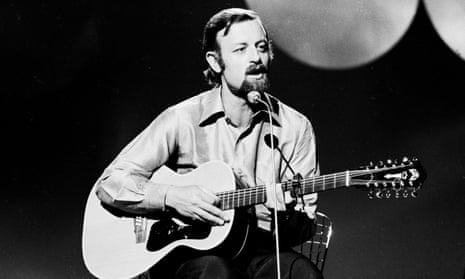Although there was never any such phenomenon as Whittakermania, Roger Whittaker, who has died aged 87, built a huge international following in a career that spanned six decades. As the Boston Globe noted of his stage performances: “No one gets high. No one gets hysterical with excitement. And yet Roger Whittaker is one of the most popular entertainers in the world.”
Whittaker’s smooth baritone voice and songs of love, loss and yearning endeared him to audiences worldwide. His best known songs, where his voice was invariably accompanied by keening strings, included 1969’s Durham Town (the Leavin’), I Don’t Believe in If Anymore (1970), which reached No 8 in the UK, The Last Farewell (1971, reissued in 1975 to become a Top 20 hit in the US and a chart-topper in 11 countries), and Wind Beneath My Wings (1982).
He also had a trademark whistling ability, which he used to perform The Skye Boat Song in a duet with Des O’Connor, reaching the UK Top 10 in 1986.
Though he did not rack up chart hits as prolifically as the Beatles or Abba, his frequent TV and live appearances made him a household name in many countries. In the mid-1980s, he was acknowledged as Germany’s most successful recording artist. He made several recordings in German, singing the lyrics phonetically since he could not speak the language.
He was never fashionable, but never out of fashion with his audience. When he recorded a song such as Green, Green Grass of Home, it lacked the drama of Tom Jones’s version and his treatment of Song Sung Blue was homelier and more avuncular than Neil Diamond’s original, but it all became Whittaker music.
He liked to say he represented the “silent majority”. He defined this as “the kind of person who when he marries becomes a parent and a taxpayer and devotes himself to bringing up his children properly – all in all, a pretty straight-down-the-line guy”.
In the 70s, when rock music was dominating the record industry, Whittaker was dropped by his label, RCA, despite the fact that he had sold several million discs. He decided to market his 1977 album, All My Best, on TV. “I was the first act to go on TV with records,” he said. All My Best sold nearly 1m copies.
Born in Nairobi, Kenya, he was the son of Vi (nee Showan) and Edward Whittaker, who had owned a grocery shop in Staffordshire, but moved to a farm near Thika after Edward sustained serious injuries in a motorcycle accident and had been advised that a hot, dry climate would aid his recuperation.
Edward developed a new grocery business, while Vi worked as a teacher. Roger, who could speak Swahili before he learned English, attended the Prince of Wales school (now Nairobi school). He had begun learning the guitar at seven.
After school, where he had sung in the choir, he was called up for national service. He was posted to the Kenya Regiment, and for two years was involved in fighting the anti-colonial Mau Mau rebels. He subsequently attended the University of Cape Town to study medicine, but after 18 months he left and trained to be a teacher.
In 1959 he moved to Britain and enrolled at Bangor University in north Wales, where he studied zoology, biochemistry and marine biology. He also began to make his first moves into music, playing gigs to earn some cash and recording songs on flexi discs distributed with the university newspaper.
These provoked interest from Fontana records, and in 1962 his first single releases were The Charge of the Light Brigade and Steel Men.
He played concerts in Northern Ireland and appeared on the Ulster TV show This and That, and his career developed with constant touring around Britain.
“I learned how to entertain in the clubs of the north-east of England, the working men’s clubs where the miners go,” he said. In 1964 he married Natalie O’Brien.
By 1968 he was touring internationally and even had a TV showcase in the Soviet Union. At the 1968 Knokke song contest in Belgium, Whittaker performed If I Were a Rich Man, from the musical Fiddler on the Roof, and his own whistling composition, Mexican Whistler, helping Britain to win the competition, and both tunes were hits in France, the Netherlands and Belgium. In 1969 he scored his first UK Top 20 hit with Durham Town (the Leavin’), which reached No 12. Its easy-listening mixture of sentimentality and nostalgia, with its mournful references to war and bereavement, was typical of Whittaker’s work.
He revisited his African background in the documentary film Roger Whittaker in Kenya: A Musical Safari (1982), and in 1986 he published his autobiography (written with his wife), So Far, So Good. Three years later, he received the news that his parents had been attacked by a gang of robbers in Kenya, leaving his father dead and his mother brutally beaten. She subsequently moved back to Britain.
Outside music, Whittaker had a shrewd eye for antiques. His collection of paintings, furniture and works of art was auctioned by Sotheby’s in 1999 for more than £1m, at the same time as he sold his Herefordshire home and moved to Essex. Latterly he lived in the south of France.
He is survived by Natalie and by their five children, Emily, Lauren, Jessica, Guy and Alexander, 12 grandchildren, two great-grandchildren and his sister, Betty.

Comments (…)
Sign in or create your Guardian account to join the discussion